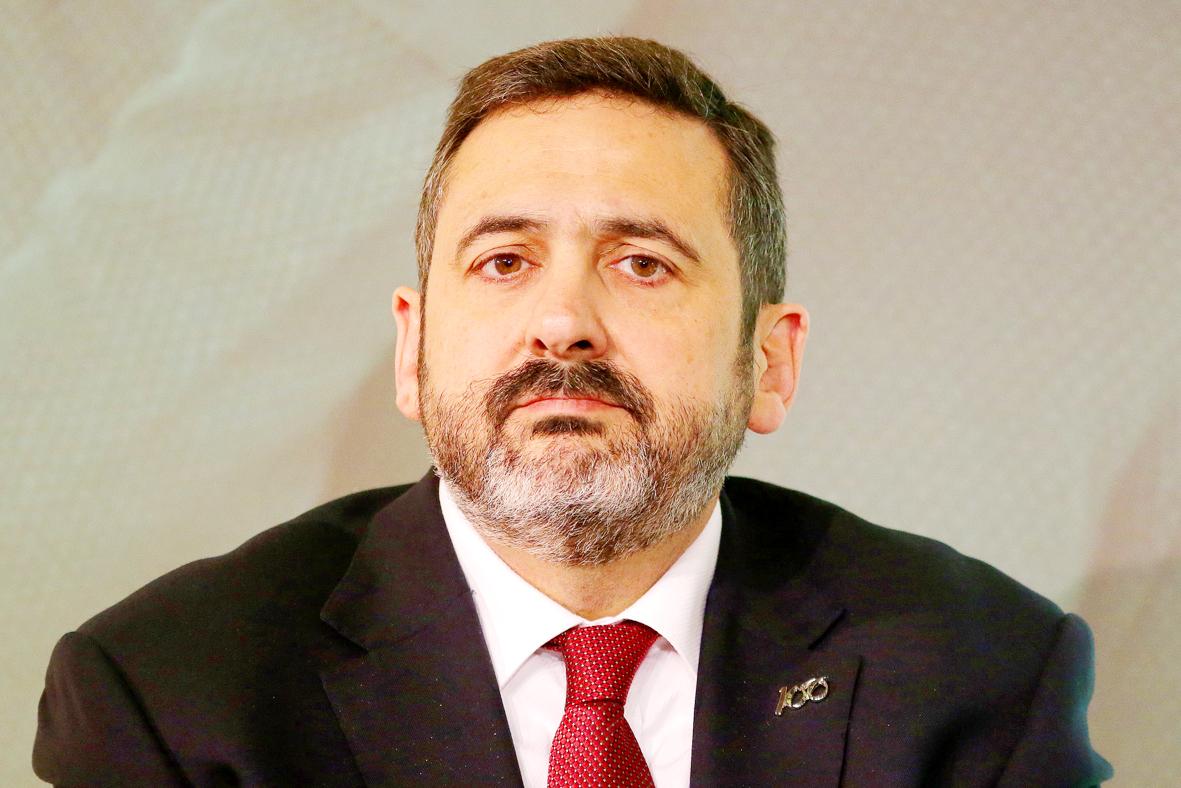British Airways (BA), which is slashing thousands of jobs as the COVID-19 pandemic decimates the travel sector, yesterday said that chief executive officer Alex Cruz is stepping down “with immediate effect,” but gave no reason.
Parent group IAG SA added in a statement that Cruz, who has been BA chief executive for four-and-a-half years, would be replaced by its Aer Lingus boss Sean Doyle, who would take on the CEO role immediately and succeed Cruz as the airline’s chairman after a transitional period.
It said that Cruz would remain a non-executive chairman.

Photo: AFP
A spokeswoman declined to comment on media speculation over the nature of his departure.
British Airways is in the process of axing 13,000 jobs, or about one-third of its workforce, in response to the fallout from the pandemic.
New IAG chief executive Luis Gallego, who took the reins from Willie Walsh just last month, said that the reshuffle was aimed at emerging stronger from the crisis.
“We’re navigating the worst crisis faced in our industry and I’m confident these internal promotions will ensure IAG is well-placed to emerge in a strong position,” Gallego said in the statement.
“I want to thank Alex for all that he has done at British Airways. He worked tirelessly to modernize the airline in the years leading up to the celebration of its 100th anniversary,” Gallego said.
“Since then, he has led the airline through a particularly demanding period and has secured restructuring agreements with the vast majority of employees,” Gallego added.
Cruz gave no comment on his surprise departure.
Speaking last month, he defended heavy job cuts at the airline and argued that customers were “still afraid of traveling.”
“COVID has devastated our business, our sector. We’re still fighting for our own survival,” he told the British parliament’s Transport Select Committee.
IAG has forecast that it would take until at least 2023 for passenger demand to recover to pre-pandemic levels.
BA pilots in July voted to accept a package including job and pay cuts aimed at avoiding even more redundancies.
Cruz told lawmakers that the pandemic had created an “impossible situation.”
“As CEO of British Airways, I have to take responsibility. I cannot ignore the situation. I had to act incredibly fast,” Cruz said during his parliamentary grilling on Sept. 16.
“I deeply, deeply regret that way too many loyal and hardworking colleagues of mine are having to leave our business and I understand why MPs are concerned,” he said.
“This is an impossible situation. I am completely dedicated and focused on protecting those nearly 30,000 jobs of all those BA colleagues who will remain within the business,” he added.
“People are still afraid of traveling... We don’t see a short term coming-back of our passengers,” Cruz said.
Additional reporting by Bloomberg

BYPASSING CHINA TARIFFS: In the first five months of this year, Foxconn sent US$4.4bn of iPhones to the US from India, compared with US$3.7bn in the whole of last year Nearly all the iPhones exported by Foxconn Technology Group (富士康科技集團) from India went to the US between March and last month, customs data showed, far above last year’s average of 50 percent and a clear sign of Apple Inc’s efforts to bypass high US tariffs imposed on China. The numbers, being reported by Reuters for the first time, show that Apple has realigned its India exports to almost exclusively serve the US market, when previously the devices were more widely distributed to nations including the Netherlands and the Czech Republic. During March to last month, Foxconn, known as Hon Hai Precision Industry

Taiwan Semiconductor Manufacturing Co (TSMC, 台積電) and the University of Tokyo (UTokyo) yesterday announced the launch of the TSMC-UTokyo Lab to promote advanced semiconductor research, education and talent development. The lab is TSMC’s first laboratory collaboration with a university outside Taiwan, the company said in a statement. The lab would leverage “the extensive knowledge, experience, and creativity” of both institutions, the company said. It is located in the Asano Section of UTokyo’s Hongo, Tokyo, campus and would be managed by UTokyo faculty, guided by directors from UTokyo and TSMC, the company said. TSMC began working with UTokyo in 2019, resulting in 21 research projects,

Ashton Hall’s morning routine involves dunking his head in iced Saratoga Spring Water. For the company that sells the bottled water — Hall’s brand of choice for drinking, brushing his teeth and submerging himself — that is fantastic news. “We’re so thankful to this incredible fitness influencer called Ashton Hall,” Saratoga owner Primo Brands Corp’s CEO Robbert Rietbroek said on an earnings call after Hall’s morning routine video went viral. “He really helped put our brand on the map.” Primo Brands, which was not affiliated with Hall when he made his video, is among the increasing number of companies benefiting from influencer

Quanta Computer Inc (廣達) chairman Barry Lam (林百里) yesterday expressed a downbeat view about the prospects of humanoid robots, given high manufacturing costs and a lack of target customers. Despite rising demand and high expectations for humanoid robots, high research-and-development costs and uncertain profitability remain major concerns, Lam told reporters following the company’s annual shareholders’ meeting in Taoyuan. “Since it seems a bit unworthy to use such high-cost robots to do household chores, I believe robots designed for specific purposes would be more valuable and present a better business opportunity,” Lam said Instead of investing in humanoid robots, Quanta has opted to invest